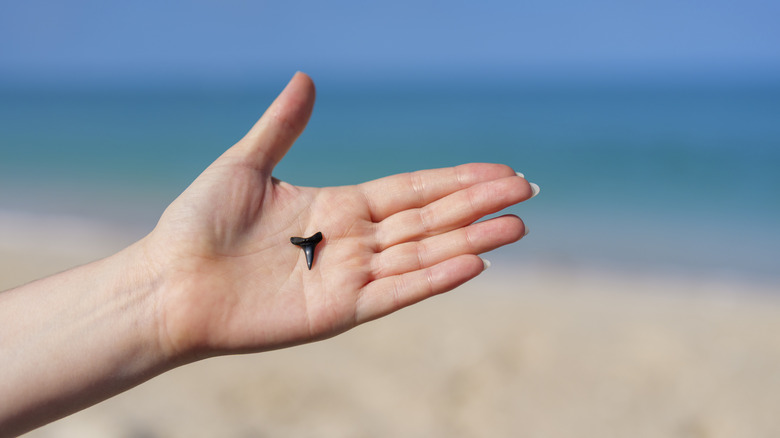The Stunning Florida Beach Where You Can Find Prehistoric Shark Teeth (And Take Them Home)
You've probably come home from the beach with a collection of pretty rocks and shells at some point. If you're lucky, you might find one that's a rare color or particularly shiny. The sea can throw up some interesting treasures, and what you may find on Florida's Caspersen Beach is a worthy example of that. Sometimes referred to as the Shark Tooth Capital of the World or simply Shark Tooth Beach, this stretch of sand in Venice, Florida, has some of the most abundant deposits of old and fossilized shark teeth. Most often black or dark brown, these treasures can be found in the sand on the beach or in the water. The phenomenon of shark tooth hunting is so popular on this beach, you can even rent shovels and spend the day digging around in the sand collecting these little sea souvenirs. More serious shark tooth searchers often carry a sand sifter, and you'll see several people on the beach using these contraptions to sieve through the shells for a shark tooth.
There are some interesting geological and biological factors that have resulted in Caspersen Beach being seeded with so many shark teeth. Walk its length and you will cross large patches where sand is replaced by countless shells and coral remnants, with the occasional shark tooth hidden in there as well. The beach is quite popular and can get crowded during summer days. Visit on a quiet day, and you will find that Caspersen has more to offer than just shark teeth — the beach itself is quite picturesque. However, the waves can get a little rough, and the sea floor is quite steep, so only experienced swimmers should attempt going in the water.
Why does Caspersen Beach have so many shark teeth?
The coastal shelf on which Caspersen Beach and its surrounding area is located was, at one point, underwater. These waters were home to a profusion of marine life, including a large number of sharks. As the water receded, these once-underwater areas became accessible, allowing one to easily sift through the sand and find remnants of the past that were put there when it was all still under the ocean. While there are some seriously shark-infested beaches in America, Caspersen is luckily not one of them anymore.
So why do shark teeth outnumber the remnants of so many of the other creatures that would have lived, died, and decomposed at the same time? And why aren't people finding the rest of the shark's skeleton? There are two major factors at play. The first is that sharks have a significantly higher number of teeth than most marine animals. Depending on the species, they can have numbers in the hundreds or even the thousands. Thus, when a shark dies and decomposes, it leaves a lot of teeth behind. Second, unlike most fish, which have bony skeletons, sharks have skeletons made of cartilage, which is softer and decomposes more easily. Therefore, fossils of ancient shark skeletons usually do not survive and are extremely rare finds.
Despite how interesting they may be, shark teeth are some of the most common fossils one can find. Because of how much Caspersen Beach has been combed over the years, finding a large tooth in the sand is unlikely. If you're looking for a rare shark tooth, the kind that belonged to one of the bigger sharks that have their own movie franchises, you may have to go some distance out to sea and dive to the ocean floor.
Caspersen Beach is worth a visit even without the shark teeth
Despite it getting buried under the reputation of being a shark tooth gold mine, Caspersen gets a lot of visitors who come just to enjoy the beach. In fact, it is one of the top-rated beaches in the area, and the scenic beauty doesn't disappoint. The beach has several layers, starting with scrubby vegetation that gives way to mangroves and marshlands, sandy patches, large areas covered with shells, and even some sand dunes. On crowded days, consider walking further down the beach where it's still possible to find a quiet spot, since much of the beachfront has been left in its natural state. Of course, the Sunshine State has no dearth of sandy stretches and under-the-radar Florida beaches.
Unfortunately, the last few hurricane seasons haven't been kind to Caspersen Beach, and parts of the beach have been heavily eroded. In fact, even Florida's best beach of 2025, located in Delnor-Wiggins Pass State Park about two hours south of Caspersen, was affected by hurricanes. However, repairs are underway at both beaches, and both Caspersen and Delnor-Wiggins are accessible, but with limited facilities. Since part of the road leading to Caspersen Beach was damaged, getting to the sandy stretch requires a bit of a walk. However, fans of the beach still flock there and the shark tooth explorations continue, with most travelers continuing to find at least a few teeth on every visit.


